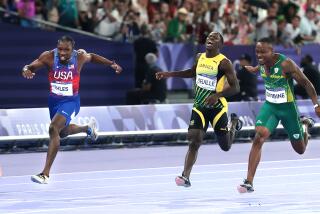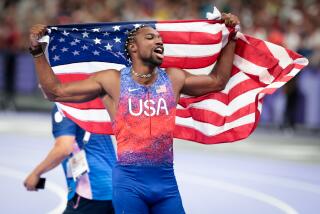Historic First: Two Teams Share Gold
- Share via
NAGANO, Japan — They distributed four gold medals at the completion of two-man bobsled Sunday.
In a first, there was a tie for first.
Never in the history of the Olympics or world championships, in either two- or four-man competition, had there been a gold-medal tie.
Canada I, driven by Pierre Lueders, forged it by making up three-hundredths of a second on Italy I, driven by Guenther Huber, in the fourth and final heat.
Amid a chilling snow, the gloveless, sockless Lueders clocked 54.24 seconds in that heat for a cumulative total of 3:37.24. Huber then salvaged the tie with a final run of 54.27 seconds.
“When I came in and saw everyone jumping up and down and celebrating, I didn’t know if it was for gold or silver,” Huber said. “Then I realized it was gold for both. I couldn’t believe it.”
Both drivers were ecstatic.
“It was so close that it would have been a travesty if either of us had lost it,” said Lueders. “It’s fantastic.”
Said David MacEachern, his brakeman: “Basically, to tie after four runs and four miles at about 130 [kilometers per hour] just doesn’t happen in bobsledding.
“It’s so crazy. You can’t even blink in three-hundredths of a second, maybe half blink. It’s hard to contemplate, but that’s a lifetime in bobsledding.”
Technically, the 1968 Olympic two-man at Grenoble had ended in a tie between Eugenio Monti of Italy and Horst Floth of Germany, but under a rule then in place, Monti was awarded the gold because he’d had the fastest time in any of the four heats. The rule was changed after those Winter Games to allow for ties.
This was the first time in 62 years that a European had not won the two-man gold outright, and it was only the second bobsled medal for Canada, the other being a four-man gold in 1964.
“Canada will be rocking and rolling,” said MacEachern, the recipient of more than 17,000 pre-race faxes from rooters in his home province of Prince Edward Island.
Lueders, 27, had dominated the World Cup two-man since his debut in 1992 but was so determined to redeem his seventh in two-man and 12th in four-man at the 1994 Olympics that he did not attend the opening ceremony here or any of Canada’s official functions.
He said after winning Sunday that he was trying to maintain his emotional balance because he wanted to remain focused on the four-man competition, which starts Friday.
“This will probably hit like a bag of hammers when I get home,” he said.
Lueders and Huber, who won bronze at Lillehammer and is a policeman in his other life, had joked with each other in the start house before the final heat, with Lueders suggesting that the two sleds race down together because it was so close.
“I even said to him, ‘Can you imagine if we tied this thing? It would be incredible,’ ” Lueders said. “I can’t believe it happened. It’s so rare in our sport. I can’t believe we won, and we tied with someone.”
Christoph Langen, driving Germany I, took the bronze.
Both U.S. drivers had improved performances. Brian Shimer, in USA I, moved from 12th after Saturday’s first two heats to 10th. Jim Herberich, in USA II, vaulted from 11th to seventh.
Shimer, the four-time Olympian, had considered withdrawing after Saturday’s poor performance and preserving a tender hamstring for the four-man competition, in which his team has a legitimate medal chance, “but I felt we were still in the mix [in this race] and my leg keeps getting stronger and stronger. I thought it was better if I got out there today to take my mind off the four-man. I don’t think I could have lived with myself if I had just sat around and watched, and basically I felt I regained some confidence today. It’s man against mountain now, and hopefully I’ve got it conquered. We’ll find out in four-man.”
It was hoped that the U.S. wouldn’t have to wait that long.
The new Bo-Dyn sleds were considered the fastest two-man sleds in the world, and both Shimer and Herberich had driven them successfully in World Cup competition since Lillehammer. However, this was another example of the two veteran drivers being unable to translate their World Cup success to the Olympics.
“I’d be crazy if I said it didn’t frustrate me,” Shimer said.
Harvard graduate Herberich agreed and said, “The prime reason it’s so disappointing is that people sitting at home and keeping an Olympic box score think this is the best we can do” and don’t realize how successful he and Shimer are on the world stage between Olympics.
(BEGIN TEXT OF INFOBOX / INFOGRAPHIC)
Medalists
Bobsled
Men’s Two-man
Gold: Canada 1
Gold: Italy 1
Bronze: Gernamy 1
More to Read
Go beyond the scoreboard
Get the latest on L.A.'s teams in the daily Sports Report newsletter.
You may occasionally receive promotional content from the Los Angeles Times.






